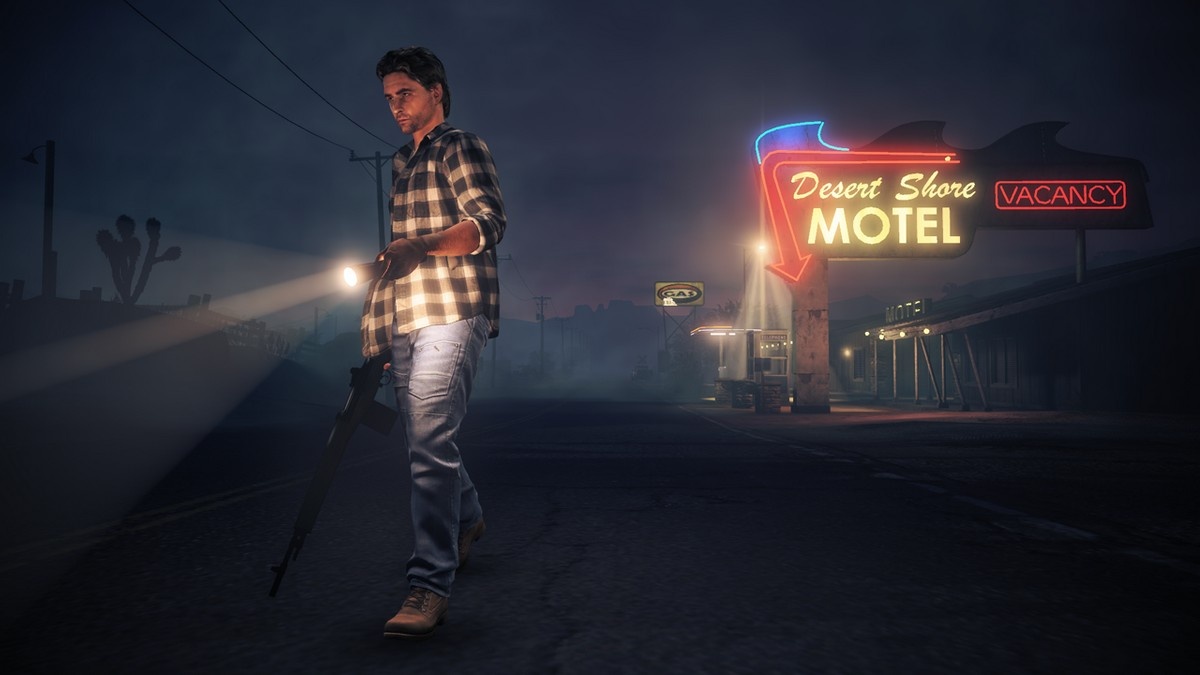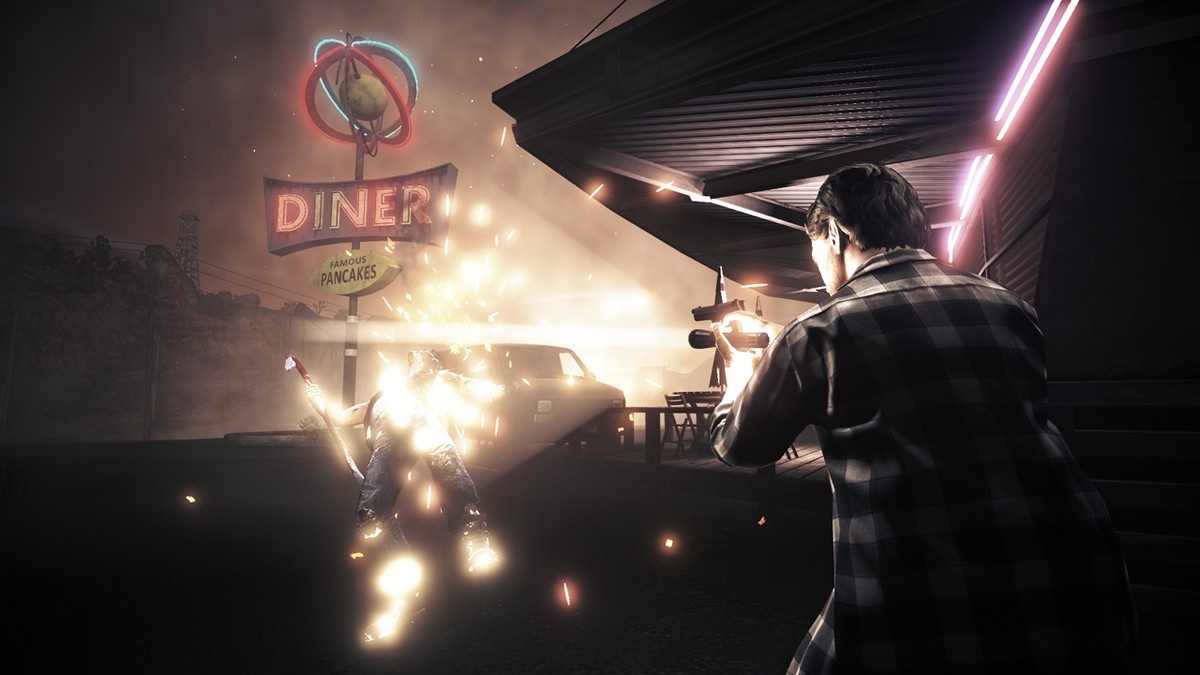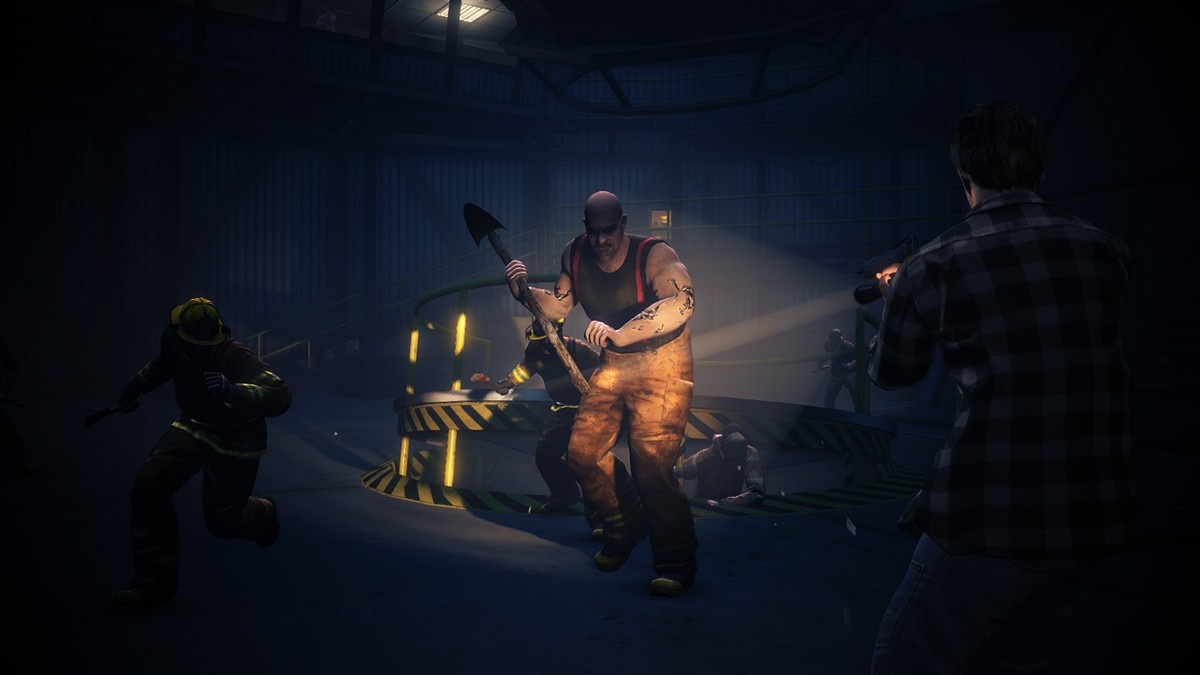2010's Alan Wake was a pleasant surprise for players looking for a scare, in part because it delivered thrills and chills without falling into the typical survival horror mold. Sure, it had its share of axe-wielding maniacs and more darkness than you could shake a flashlight at, but the game succeeded because it eschewed jump-scares and horrific imagery in favor of a quieter, smarter brand of terror. Now, the story of Alan Wake continues, sort of. Alan Wake's American Nightmare isn't the full-fledged sequel fans may be yearning for, but it is an enjoyable return to the troubled world of the titular writer, where fact and fiction are often impossible to distinguish.
Bear in mind that this is not a direct continuation of the original Alan Wake. Instead, American Nightmare is presented as a stand-alone episode of the franchise's famed Night Springs TV show--an episode that just happens to star the estimable Mr. Wake. In the show, Alan is cast as the champion of light who must find a way to defeat his dark doppelganger, the nefarious Mr. Scratch. Although it's fun to see these two jawing at each other, you may find yourself wishing that all of this conflict was building toward something directly related to the core narrative of the series.
While Alan Wake featured plenty of exposition and explanation right off the bat, American Nightmare thrusts you into the action with little in the way of either. Although there's a Rod Serling-esque narrator that occasionally chimes in to push the story along (albeit slightly), even diehard Alan Wake fans may feel a bit lost for the first 30 minutes or so. This isn't necessarily a bad thing because part of the game's charm lies in slowly unraveling the narrative via the still-important manuscript pages and the occasional discussion with the three living women that you meet. The proceedings get a bit less murky as you progress, especially after it's revealed that you'll be exploring the same three areas multiple times throughout the course of the game.

Though going back to the same locales again and again may sound gimmicky, it's actually handled deftly from a narrative perspective, which prevents it from feeling like a crutch used to artificially extend the length of the game. It's a good thing the gimmick works as well as it does because most of the game revolves around simple fetch quests that would have been downright boring if repeated in full over and over. It also doesn't help matters that the wide-open Arizona environments aren't as conducive to tension as the dense, shrouded Washington woods that helped set the tone of the first game.
Alas, while American Nightmare is technically a stand-alone story, those unfamiliar with the underlying mythology and backstory of the series won't get nearly as much satisfaction out of it as those who completed the first game. It's a shame because a simple "Previously on Alan Wake" video could have provided the necessary details to get the uninitiated up to speed, and the lack of such details is an especially glaring oversight given the first game's episodic structure. A number of references are made to the characters populating the first game's world, and quasi-appearances are made by Alan's agent Barry Wheeler, as well as the washed-up metal band Old Gods of Asgard. Although American Nightmare can be enjoyed by anyone, a history with the franchise helps to make it a more enjoyable ride.
As was the case with Alan Wake, the writing in American Nightmare is very strong, particularly if you take the time to search for and read the 50-plus manuscript pages scattered about the world. The tone of the game is much lighter than the original's, especially when conversing with the aforementioned women in each environment. Alan's "been there, done that, changed reality" attitude is a welcome adjustment to the dour writer that was on display in previous episodes, and a number of self-referential jokes might even make you chuckle. The only issue of contention here is the delivery of some of the lines, which occasionally sound stilted and disjointed. Most of Alan's voice work is solid, but the folks voicing some of the supporting characters sound like they were pulled in off the street.

When you're not busy collecting pages or chatting up astrophysicists in short cocktail dresses (yes, really), you find yourself slaying dozens of Taken, which are the enemies protected by a shroud of darkness that must be burned off with Alan's trusty flashlight. The combat remains virtually identical to that of the original game, though there are a number of new enemies that are gradually introduced to keep the action from getting stale. Although the new tanklike enemy is fairly ho-hum, two new foes stand out. One starts out as a lumbering beast before splitting into smaller, more mobile enemies every time Alan's flashlight shines on them; another is comprised entirely of those pesky crows from the first game and is wont to attack from behind if you're not paying attention. Handling these special enemies while dealing with the standard foes adds a needed bit of challenge to the frequent combat sequences.
Unfortunately, the combat in American Nightmare lacks the gut-churning, nerve-wracking intensity found in Alan Wake. This is largely due to the fact that you never even come close to running out of ammo, thanks to a plethora of ammo stations scattered around each of the environments. Part of the allure of the first game was the feeling that you needed every last flare and flashbang at your disposal if you were going to survive, but that's thrown out the window here. As a result of having too much ammo and too many flashlight batteries, you never feel any genuine sense of terror or dread as you easily mow down the waves of enemies thrown at you. Instead, you simply take out a bunch of baddies on your way to your objective before loading up on ammo and repeating the process.
However, if mowing down waves of enemies is your thing, you'll be happy to hear that American Nightmare introduces a new Arcade mode. While it might sound odd to have an entire mode dedicated to the occasionally wonky combat of the series, it actually works better here than in the story-driven main game. Although the end goal is simple (survive until dawn while scoring as many points as possible), there's a surprising emphasis on strategic thinking. Because dodging enemy attacks helps boost your multiplier, you must decide whether to kill your foes quickly or get up-close-and-personal to toy with them a bit before finishing them off. In a nice twist, it also pays to play through the campaign before diving into Arcade mode because finding manuscript pages gives you access to better weapons. Arcade mode isn't about to make anyone forget Gears of War 2's superior Horde mode, but it serves as a fun diversion once you're done with the main game.
Alan Wake's American Nightmare is strange in that it straddles the line between traditional DLC and a stand-alone game. While it's not a direct continuation of the original's story, fans of the first game may find some value in reading through as many manuscript pages as possible, though the lack of any real answers may also be frustrating. On the flip side, those new to the franchise might feel lost, thanks to the surprising absence of any backstory or exposition. Still, as was the case with the first game, Alan Wake's American Nightmare manages to overcome some glaring issues, thanks to its strong writing.
